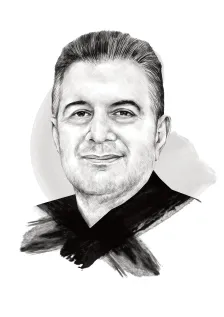Speculation has grown that similar turbulence could even reach the biggest economy of them all – the United States – running alongside talk of the de-dollarisation of the global financial system, or at least the rise in alternatives to the dollar as the world's reserve currency.
Read more: Is the petrodollar losing its lustre?
The potential for other currencies to act as the base for global exchange and investment is a hot topic in world financial centres, with plenty of analysis on the topic from eminent experts.
There has been much talk of the dollar's weaknesses on social media, with some claiming that its loss of status could lead to a wider collapse in value.
Big talk, even bigger questions
Much has been made of other assets that could be a safter, amid doubts about the tendency of the US to print dollars when it feels the need. Real estate, gold and newly digitally minted crypto currencies have all been touted as potential safer bets, in the event of any dollar collapse.
Most of these markets have witnessed much of their own destruction of wealth, as bubbles in them have burst, while all the while the dollar has kept relatively stable.
Some articles in respected international newspapers are both alarming and surprising, at a time when the US currency controls more than 80% of global trade and about 45% of deposits, according to the US Federal Reserve.
What will be the fate of these transactions and most of the dollar-denominated investments of sovereign funds in stocks and bonds?
What about the trade in oil and commodity contracts on global exchanges? What financial earthquake will strike the world if the dollar really does ever lose its role?
Precious mettle
The dollar's lack of any supply constraint, such as the gold standard that pegged its value to the precious metal, is the basis of the theory that it will one day lose its dominant role outside the borders of the US.
Some see that as inevitable, especially as viable alternatives arise.
But it's useful to remember that the greenback derives its strength from the weight of the United States – the great power that is rooted in democracy, freedoms, the rule of law, free economy, human rights, regulatory bodies, transparency, and established assets that govern its economy and financial markets internally and externally.
All of this constitutes a different kind of gold standard, one that has nothing to do with metal, but more to do with investors' mettle.
Confidence comes from these important concepts that stand behind the dollar and support the global system. They are among the reasons world central banks resort as a store of value and the main constituent of national reserves.
These soft powers look unwieldy to other great nations testing US dominance, China foremost among them. The most prominent rival to the US is seeking an end to that unipolar dominance and its rise must be taken into consideration.
China may be able to become a political, industrial, technological, and commercial world player – it's doing very well in these terms – but when it comes to currency and the exchange system, it's another story, although one that begins with some promising characteristics.
China is on manoeuvres
As it mulls its international ambitions, China is already financially active. It is laying the foundation for a new universally accepted alternative to the existing Swift interbank messaging system, which currently underpins the global transaction network among banks.
It is, in tandem, seeking to expand the emerging market group known as the Brics: Brazil, Russia India China and South Africa.
This new bloc has made great strides toward setting up a shared currency, similar to the European Union's euro, meaning there could one day be two established international currencies to act as potential dollar rivals.
So far so, promising for Beijing and worrying for Washington.
And yet, China remains ill-prepared to catch any imbalance in global financial and commodity markets – the most important of which is the oil market – due to its modest legislative structure and incomplete confidence in its financial systems, which are marred by capital controls, freedom of transfer restrictions, and one-ruling party governance, unlike US markets.




